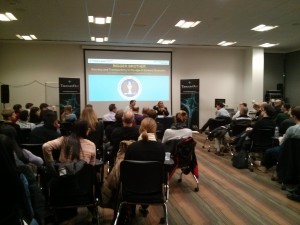Tracey Gardiner is one many PSI Broadcast and Media students who attended the Thought Out lecture at UEA London by Luke Harding who has just finished a book on the Edward Snowden affair. She reflects on the session.
Fresh from finishing his book on Edward Snowden and the NSA, journalist, Luke Harding talked about it at UEA London on Tuesday night.
Snowden, a former CIA technical worker, leaked to Guardian journalist, Glen Greenwald in June 2013 a mass of top-secret documents. These provided evidence of the mass surveillance of ordinary people by the US National Security Agency (NSA) and Britain’s spy outfit, GCHQ. It turns out they were hacking into emails, live chats, search histories and hoovering up an extraordinary quantity of information in the hope that they would also catch terrorists.

The security agencies have accused the Guardian of a gross act of irresponsibility by opening up the country to the threat of more attacks by terrorists. Luke Harding said last night that the Guardian had been extremely careful not to put lives at risk. It had not published operational details, named anyone or disclosed what spy’s actually do − that publication of the story passed a ‘high public interest test’. Interestingly, articles are shown to the security services before publication and if they make a convincing argument to exclude something for reasons of national security the Guardian would agree to take it out.
It is hard to argue with the proposition that disclosing the extent to which the security agencies felt entitled to breach the privacy of millions of people is in the publics’ interest to know.
Luke Harding was clearly dumfounded by what he saw as the muted reaction to being spied on in Britain. He speculated that the steady drip feed of James Bond and TV series Spooks had made us believe that spy’s were on our side. Or that we were still, in essence, a deferential society, tugging our forelocks at the powers that be, believing they know best.
None of that rings true. It is surely more likely that, put simply, we were not in the least surprised that the government is spying on us we just hope they don’t decide to come and get us.
Now that we do know what GCHQ has been up to and there is a public debate about the extent of the spying is there any further reason for the Guardian to mine the Snowden documents? There is always the risk that it is helping those who wish to harm us. So is the Guardian keeping the pressure on for our good, or is it in the commercial interests of the paper?
Tracey Gardiner is one of 27 PSI Broadcast and Media students who visited the Palace of Westminster this week and had a bespoke seminar in a Commons committee room with Simon Wright MP and BBC Political Correspondent, Robin Brant. They then went to the Guardian, and had a talk on the history & culture of the paper in their education centre, followed by a Q&A with their Home Affairs Editor. In the evening, they attended the Thought Out lecture at UEA London, to hear Luke Harding, another Guardian journalist, who has just finished a book on the Edward Snowden affair. The day was organised by Clare Precey, Ex-BBC Radio 1 Newsbeat presenter, reporter & programme editor, and now Journalism tutor at the University of East Anglia.
Image credit: Wikipedia Commons





